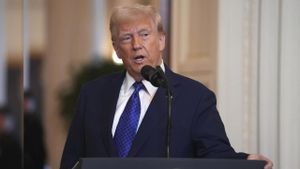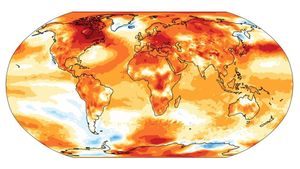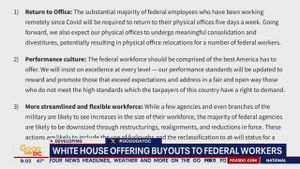Following rising tensions between the United States and South Africa, President Donald Trump announced on Sunday the freeze of all future funding to Pretoria, citing allegations of human rights violations and accusations of land confiscation. Trump’s announcement came just weeks after South Africa implemented significant land reforms under the controversial Expropriation Bill.
Posting on his Truth Social platform, Trump declared, "South Africa is confiscATING land, and treating certain classes of people VERY BADLY," emphasizing his point with all caps. He insisted, "A massive Human Rights VIOLATION, at a minimum, is happening for all to see. The United States won’t stand for it, we will act. Also, I will be cutting off all future funding to South Africa until a full investigation of this situation has been completed!" This dramatic move marks a shift from the previous administration's approach toward South Africa.
Trump’s comments were focused on the recent adoption of the Expropriation Act, which allows the South African government to seize land without compensation under certain conditions. The legislation aims to rectify historical injustices stemming from apartheid and colonialism, wherein land ownership was heavily skewed toward the white minority. While proponents argue it’s necessary for economic justice, critics warn the act may deter investment and lead to economic instability.
South African President Cyril Ramaphosa responded to Trump’s remarks by stating, "The recently adopted Expropriation Act is not a confiscation instrument, but a constitutionally mandated legal process. It seeks to provide equitable public access to land as guided by the constitution." This was echoed by Ronald Lamola, the Minister of International Relations and Cooperation, who urged Trump and his administration to gain a proper insight before jumping to conclusions. He stated, "We trust President Trump's advisors will leverage this investigative period to deepen their understandings of South Africa's policies as a constitutional democracy. Such insights will ensue respectful and informed approaches to our democratic commitments."
Trump’s funding freeze follows South Africa’s recent legal proceedings against Israel at the International Court of Justice (ICJ), where Pretoria accuses Israel of committing genocide against Palestinians, particularly during the Gaza conflict. This case has drawn Washington's ire, considering Israel is traditionally viewed by the U.S. as a close ally. Trump's supportive stance toward Israel stands in stark opposition to South Africa's position, signaling complex geopolitical dynamics at play.
Some observers interpret Trump's announcement as diplomatic retaliation against South Africa’s legal actions against Israel. Historically, U.S.-South African relations had remained stable, with the previous Biden administration maintaining ties even amid difference. Trump's intervention indicates a possible realignment of U.S. foreign policy, particularly concerning nations aligned with the BRICS bloc, which South Africa is part of along with Brazil, Russia, India, and China. This multilateral grouping has sought to challenge Western economic dominance, including norms surrounding the Western dollar.
Adding to the complexity, South Africa grapples with regional issues. The nation has dispatched troops to the Democratic Republic of the Congo to support local forces battling the M23 rebel group, believed to have connections to Rwanda. Tensions have flared over this dispute, and the recent funding freeze from the U.S. may significantly impact how South Africa navigates its geopolitical entanglements.
While South Africa's foreign minister emphasized their commitment to engaging constructively, the funding freeze presents real challenges for economic growth and stability, particularly as the country struggles with its own internal issues, such as high unemployment rates and social inequalities heightened by the historical injustices the Expropriation Bill aims to address.
Looking forward, the broader impacts of Trump's decision will likely hinge on the outcomes of the proposed investigations. How this plays out could redefine U.S.-South African relations, setting the stage for either increased diplomatic friction or potential pathways for negotiation and cooperation. For South Africa, it presents another layer of challenges amid its pursuit of equitable land reform and the drive to assert its position within the global arena.



